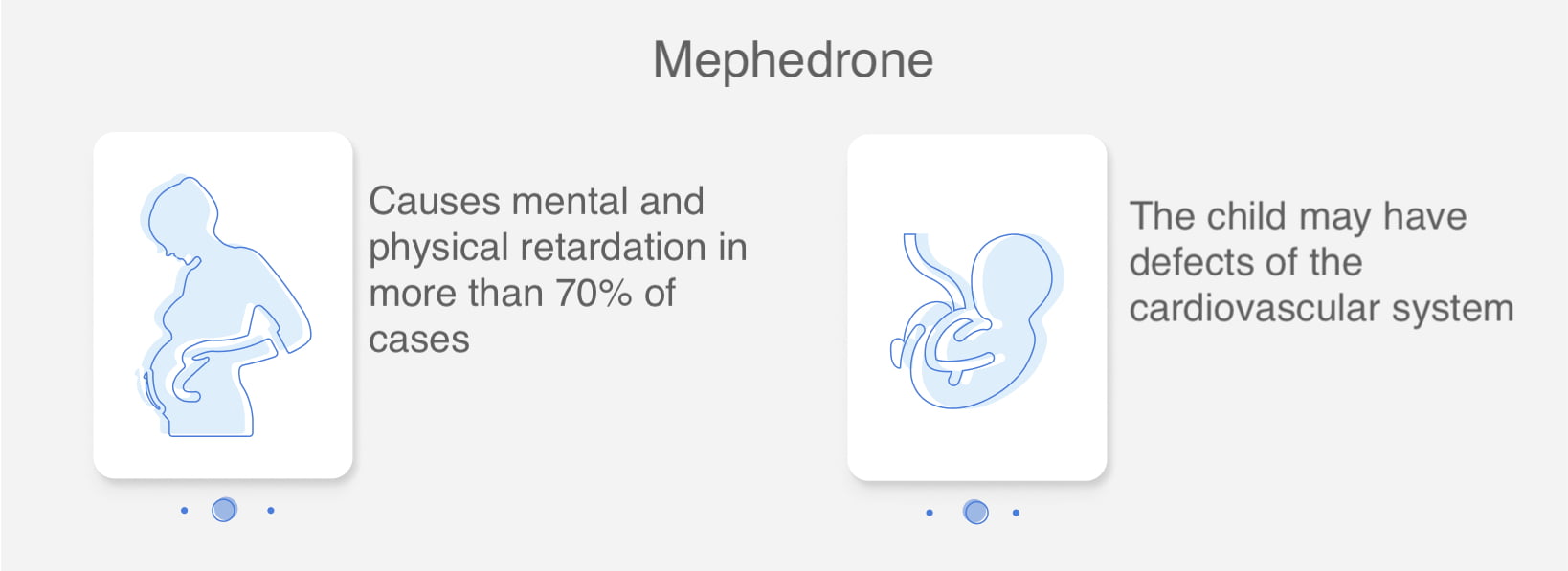Mephedrone is a stimulant narcotic substance that induces a state of euphoria, increased motor activity and sociability. It is a synthetic cation with the addition of a methyl group. Due to this substitution it is able to pass through the blood-brain barrier and the placental barrier. The consequences of using mephedrone during pregnancy (mephedrone in pregnancy) can be associated with fetal growth retardation, hepatotoxic effect in the mother, negative effects on the nervous and cardiovascular systems.
Effects of Mephedrone
Mephedrone takes part in the release of neurotransmitters and monoamine reuptake. Neurotransmitters are released in large quantities, which explains the bright euphoric effect – the use leads to a powerful release of joy hormones (dopamine, serotonin), but after 20-30 minutes the effect weakens noticeably, which is due to the short elimination half-life of the active substance. Pleasant sensations leave quickly, which causes a desire to take the dose again. In some cases, the daily dose of the substance exceeds 1.5 grams, which is fraught with dangerous side effects.
After a single use, such characteristic symptoms are observed:
- Increased sweating
- Increased heart rate in the pregnant woman and the fetus
- Aggressiveness
- Chest pain
- Headache
Nausea may develop into vomiting, increased anxiety and susceptibility, up to and including paranoia. Intranasal use irritates the mucous membranes and causes nasal bleeding.
Danger of using mephedrone in pregnancy
Excessive dosage is fraught with increased chest pain, tachycardia, increased blood pressure, seizures, paranoid delirium. The described reactions are an indication for immediate hospitalization.
Mephedrone is a substance with high addictive potential, which leads the pregnant woman to switch to intravenous infusion of the drug. The substance penetrates the bloodstream immediately, with a high likelihood of death in an overdose.
The pathogenetic mechanism of addiction to Mephedrone is associated with a change in the neurochemical reactions in the brain: the concentration of dopamine and serotonin is disturbed. Psychostimulants reduce the quantitative content of serotonin and its metabolites in all biological fluids. In acute intoxication there is increased physical activity, clarity of thought.
Various organs and systems are affected
Mephedrone is a neurotoxic substance that subsequently causes serotonin deficiency, affects liver and brain cells, and provokes the development of oxidative stress. Severe complications appear after 1-2 months of systematic use of the substance. Such side effects against the background of regular use of Medefron are known:
- Organs of the reproductive system: in pregnant women there is an increased risk of placenta rejection and premature birth;
- Circulatory system: rapid progression of pulmonary embolism, circulatory disorders of the brain, which can lead to stroke, visual impairment, up to its complete loss;
- Urinary organs: severe kidney damage due to the fact that the end metabolites of the substance are excreted with the urine;
- cardiovascular system: increased heart rate, abnormal heart rhythm, increased blood pressure, hypertensive crisis, heart attack;
- Psycho-emotional state: susceptibility to psychosis, severe depression, suicide.
Psychostimulants, including mephedrone, negatively affect the functioning of the immune system, lead to physical exhaustion, decrease the body’s resistance to dangerous diseases: various types of hepatitis, human immunodeficiency virus. Weakness of labor activity, premature expulsion of waters, delayed placenta, high risk of bleeding are possible.
Effect on the fetus
Mephedrone causes mental and physical developmental delays in over 70% of cases. The child may have defects of the cardiovascular system. The percentage of pregnancy failure increases, and there is a risk of having a child with characteristic behavioral disorders: increased excitability, aggressiveness, tendency to depressive states. A woman who has used Medefron during pregnancy may give birth to a child with developed drug addiction.
Most babies born to women with substance abuse problems were born with varying degrees of hypoxia and asphyxia, intrauterine infection, and hemolycrodynamic abnormalities.
Signs of overdose
The consequences of Mephedrone in pregnancy are greatly exacerbated by a significant overdose. In case of overdose, such characteristic symptoms appear:
Weakness of breathing, up to complete stop:
- Discoloration of the skin
- Disflexibility of the body
- Weakening of the pulse
- Disturbances of consciousness
- Severe pain/constriction in the chest
Final Thought
Foam and vomiting from the mouth, involuntary urination, development of convulsions are often observed. According to the results of clinical studies, against a background of high estrogen there is a greater concentration of free dopamine, its breakdown slows down. When estrogen, progesterone and stimulants interact with each woman, different effects are observed, depending on the initial concentration of sex hormones.



